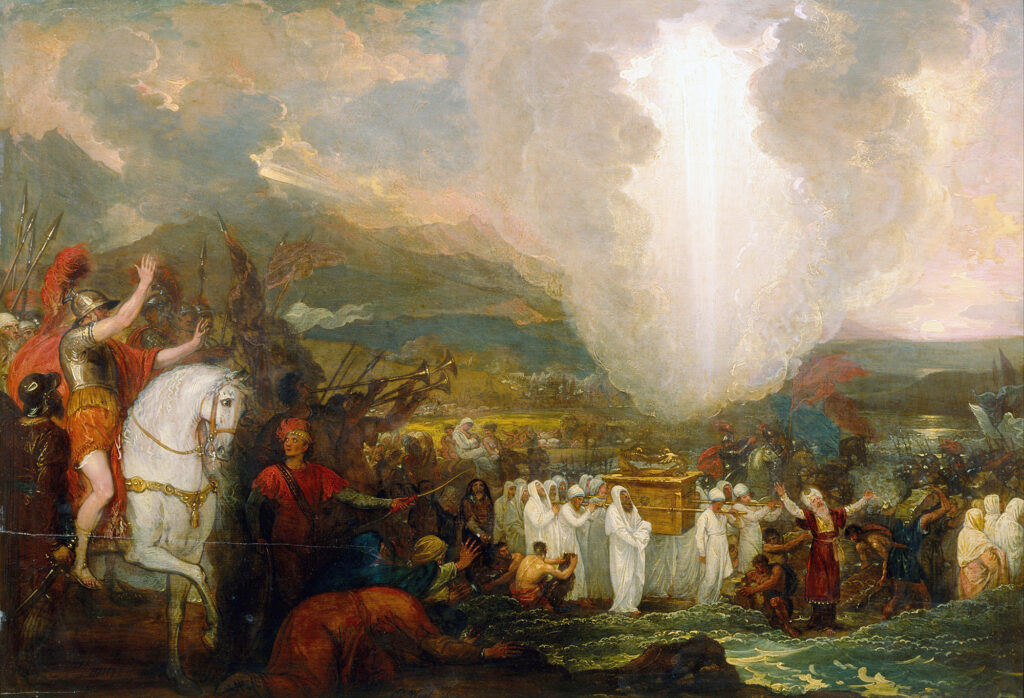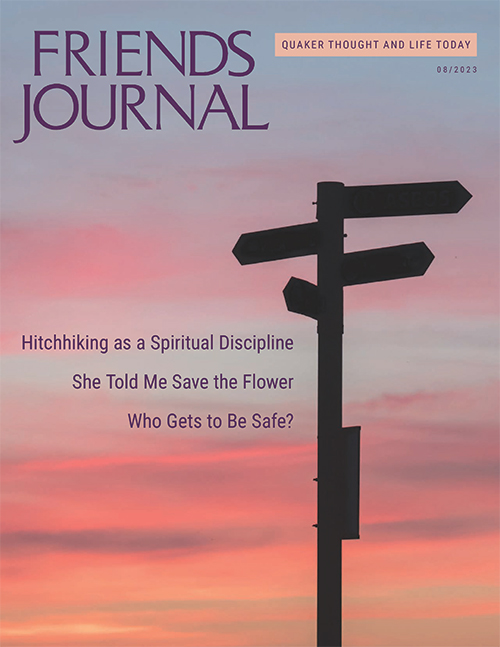In seventeenth-century England, the Bible was authoritative and was cited by Friends when explaining their actions. In what follows, I invoke Scripture not as an authority but for the images and stories It brings to some of us, and to show the mindset of early Friends who first articulated the testimonies. Right reason may be more important today in our secular society, but our testimonies rest on both, and I shall be using both to discuss them.
Quaker testimonies have traditionally stood on a three-legged stool: Scripture and right reason have been used to validate them and explain them to the world, but primary was a leading from the Inward Teacher, the Holy Spirit, the Light. This leading, however, was always subject to the discernment of the gathered meeting. I shall be using both Scripture and right reason to explain the testimonies, but the third, the Light, must be experienced. After all, we are an experiential (George Fox would have said “experimental”) religion.
As mentioned, the leading of the Spirit is primary. We can see this in Fox when he was asked to become a captain over his fellow prisoners in Derby jail. He declined, saying: “I lived in the virtue of that life and power that took away the occasion of all wars, and I knew from whence all wars did rise, from the lust according to James’s doctrine,” referring to James 4:1-3. The biblical text may have been a validation of his opening, but without his experience of the “life and power,” the Scripture would have been hollow for him; for those to whom he was speaking, however, Scripture was crucial. Keep in mind that the testimonies were weapons in the spiritual warfare we now know as the Lamb’s War. They confronted the hypocrisy of those who professed Christ but didn’t follow Him.
A common modern acronym for the testimonies is SPICES: simplicity, peace, integrity, community, equality, and stewardship. They all witness to our experience of the Light and are of a piece, working together as threads in a single cloth. We can’t pick and choose without tearing the fabric. Early Friends spoke of one testimony, as in “our Christian testimony,” but modern Friends are left with a list of separate testimonies.
Simplicity
“Blessed are the pure in heart: for they shall see God” (Mt. 5:8 KJV). Simplicity brings to mind the distinction between needs and wants. In the Sermon on the Mount, we are told, “No man can serve two masters: for either he will hate the one, and love the other; or else he will hold to the one, and despise the other. Ye cannot serve God and mammon” (Mt. 6:24). Jesus then goes on to speak to the condition of worry, advising us not to be concerned with the nonessentials (verses 25–34). The popular 1970s bumper sticker suggests right reason is the basis for simplicity: “Live simply that others may simply live.”
Peace
“Blessed are the peacemakers: for they shall be called the children of God” (Mt. 5:9). Peace is the testimony for which Quakers are probably best-known. Peace is more than the absence of war. Just war theory, conceived by Augustine and further developed by some Spanish Jesuits, allowed for violence when it was to protect the innocent. In Gethsemane, however, when Jesus was being arrested, Peter defended him with a sword, wounding a slave of the high priest. Jesus told Peter to put away his sword, and then healed the slave. (This incident is recorded in all four gospels.) Violence was not to be used, even to defend Jesus.
Integrity
In our old books of discipline, there is a section on truth-telling. This is now subsumed under the testimony of integrity. Our refusal to take an oath is one expression of integrity, and it is supported in two verses of Scripture: James 5:12 and Matthew 5:33–37. Right reason denies a double standard of truth in which we are only bound to be truthful when under oath. But integrity goes far beyond just truth-telling. We won’t say one thing and do another; we are called to “walk the talk.” This testimony and the testimony on community provide the basis for the Quaker values touted by many Friends institutions: K–12 schools, universities, retirement communities, and some social justice organizations.
Community
We need to rely on one another. There is the oft-quoted observation of a Roman pagan who pointed out to his friend: “Behold the Christians; see how they love one another.” This is community. Can we still maintain our community when we are scattered thinly throughout the world and no longer living in close-knit communities? Quaker homes and retirement communities tout the Quaker value derived from this testimony.
Equality
Equality was testified to in the early days by Quakers’ refusal to give hat honor, i.e., to remove one’s hat before one’s supposed superiors. Equality was also demonstrated through plain speech; the use of “thou,” “thee,” and “thy,” the second-person singular form, was used. Most of society used the second-person plural form “you” to address someone who was considered “their better.” Friends refused to do this; they addressed everyone in the same way. Today equality is still an issue. How welcoming are we to those who have experienced misfortune, trauma, or oppression, those who are most in need of the healing Light?
Stewardship
This testimony speaks of our concern for God’s Creation. In short, it is to be mindful of our stewardship—not ownership—of all we possess. There is some question as to whether this is truly a testimony. This testimony may not be accepted universally by Friends, even here in North America. Not all testimonies are generally accepted, but by and large, they did start out with general acceptance. Due to outside influence, they were sometimes forgotten; rarely, if ever, were they actually laid down.
Other Testimonies
We often forget our religious testimonies, or we take them for granted. We have a testimony against water baptism; ours is a spiritual baptism found in the gathered meeting.
We have another testimony against the celebration of communion, remembering the Last Supper. Quaker communion is also found in the gathered meeting. We testify against the celebration of special days like Christmas on December 25. (There is no Scripture telling us when it happened.) We testify against a paid clergy, support for which seventeenth-century Quaker writer Robert Barclay finds in the Gospel of Matthew: “Heal the sick, cleanse the lepers, raise the dead, cast out devils. Freely ye have received, freely give” (Mt. 10:8). Yet toward the end of verse 10, Jesus did add: “for the workman is worthy of his meat,” which provides some wiggle room for pastoral meetings and staff on some unprogrammed yearly meetings. We don’t ordain ministers but record ministers who are called by the Spirit; this is not just semantics.
But these are not the only testimonies. Quakers were considered to be radical Puritans: Puritans being those who would purify (hence the name) the Church of practices not in Scripture. Our testimonies against art, music, gambling, and other frivolous diversions have been long forgotten in many meetings. Barclay lists many of these testimonies in his An Apology for the True Christian Divinity in chapter 15.
The very word “testimony” means that people testify to something. I think of the Zen adage: “Don’t confuse the finger pointing to the moon with the moon itself.” What is it to which our testimonies point? The traditional Quaker understanding was that we are convinced of the Truth. (Our early name was “Friends of the Truth.”) This brings us to ask, as Pilate asked Jesus (Jn. 18:38): “What is truth?” If Jesus came to bear witness to the Truth, it seems to me that Truth is a logical place to start when trying to understand what it is to which the testimonies witness.

Convincement and Truth
I am a convinced Friend, meaning I am not a birthright Friend; I was not born into the Religious Society of Friends. So what is it of which I was convinced? Was I really convinced, or did I simply give intellectual assent to the testimonies? Is there anything we can say about that moon to which our finger points? Bear with me here; there’s more Bible stuff, but it helps make my point. In the first chapter of the Gospel of Mark, Jesus told his listeners: “The time is fulfilled, and the kingdom of God is at hand; repent ye, and believe in the gospel” (Mk. 1:15). The word repent is a translation of the Greek metanoia (μετάνοια), which the Merriam-Webster Dictionary defines as “a transformative change of heart: especially a spiritual conversion.” Although the repenting of sins would be a part of this, it is much broader and deeper than that.
An example of metanoia from the Bible is the instance of Saul of Tarsus’s mystical experience on the road to Damascus, as recorded by Luke in the Book of Acts (Acts 9:1–8) and by Paul in his letter to the church in Corinth. He was traveling to Damascus with a warrant for the arrest of followers of The Way (followers of Jesus) in the synagogues in that city. After his experience, he went into the Arabian desert; when he returned, he preached Jesus as the Messiah (Christ). This was so significant a reversal that he changed his name to “Paul.”
I knew a man in Christ above fourteen years ago, (whether in the body, I cannot tell; or whether out of the body, I cannot tell: God knoweth); How that he was caught up into paradise, and heard unspeakable words, which it is not lawful for a man to utter. Of such an one will I glory: yet of myself I will not glory (2 Cor. 12:2–5a).
An example more pertinent to Quakers is from George Fox’s Journal:
Now was I come up in spirit through the flaming sword, into the paradise of God. All things were new, and all the creation gave another smell unto me than before, beyond what words can utter. I knew nothing but pureness, and innocency, and righteousness, being renewed up into the image of God by Christ Jesus, so that I say that I was come up to the state of Adam which he was in before he fell. The creation was opened to me, and it was showed me how all things had their names given them according to their nature and virtue.
The common theme is newness and being beyond words. It would seem the Truth to which the testimonies point is beyond words. Do our testimonies still bring others into the Light? Have they outlived their usefulness? Just as God could not be seen by the 12 tribes of Israel in the desert (only His glory could be seen through the cloud of smoke that followed them in the desert), that to which the testimonies testify cannot be spoken. They are our cloud of smoke.





> Quakers were considered to be radical Puritans
Were they? By whom? Not the Puritans, who had very mixed feelings about Friends, up to and including executing us. There are various ideas about what early Friends “were”. These seem to me to be motivated more by what the author wants contemporary Friends to be than by what early Friends and their contemporaries thought. Does the author want us to (have always) be(en) Bible-believing charismatic congregationalist Christians? Or does the author want us to (have always) be(en) an extension of a continental European Anabaptist movement into the English-speaking world? Unitarian universalists avant-la-lettre? Polysemous mystics? Whatever.
Our Society certainly grew out of the same religious and political turmoil of the English Reformation and the Wars of the Three Kingdoms as did the Puritans and many others. But that doesn’t make us the same.
When I became a convinced Friend in 1968, the “C” stood for “Continuing Revelation” according to my memory. That is definitely more distinctively Quaker than community, which most religions profess.
“Religion” is about communication and communication is about language and language involves the use of metaphor. The “truth” religion is attempting to communicate derives from a personal encounter with the “Divine” and trying to communicate that experience to others is indeed “beyond words” which to be successful, requires that both parties are of the same culture and language. If one believes (is convicted) that “Divine Spirit” (“inner light”) is the “essence of God” that manifests in the world and in human beings as the source of kindness, compassion, patience, caring, and hope that belief would lead to a faith that would require one to emulate this as a reflection of God’s attributes in our lives. My peripheral association with Quakers from attending Friends meetings for worship has led me to believe that Quakers do indeed try to emulate this.
This is a helpful look at the “SPICES” which have come to be a shorthand
pneumonic for Quaker school teachers to innocuously describe Quakerism
to their mostly unQuaker students. Thanks !